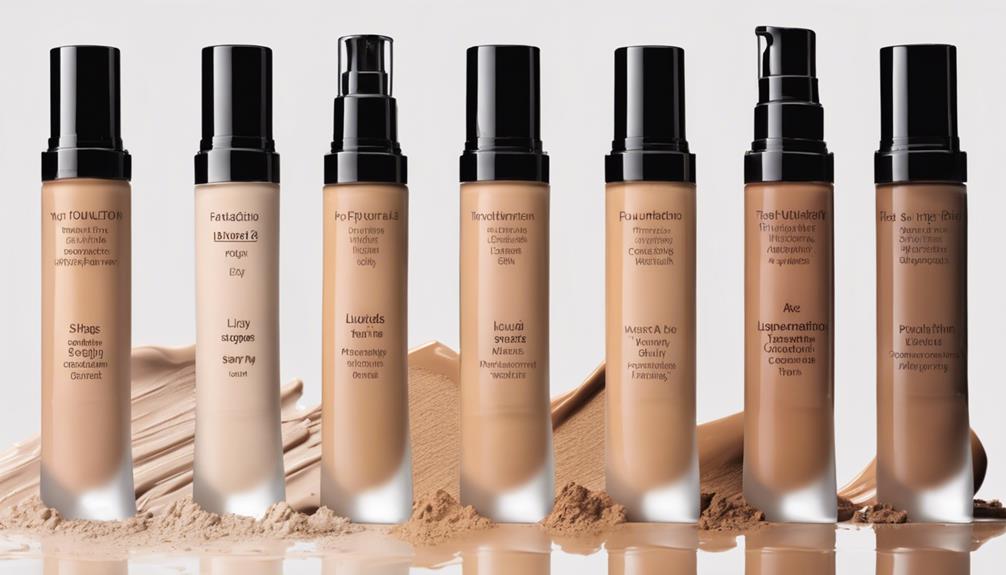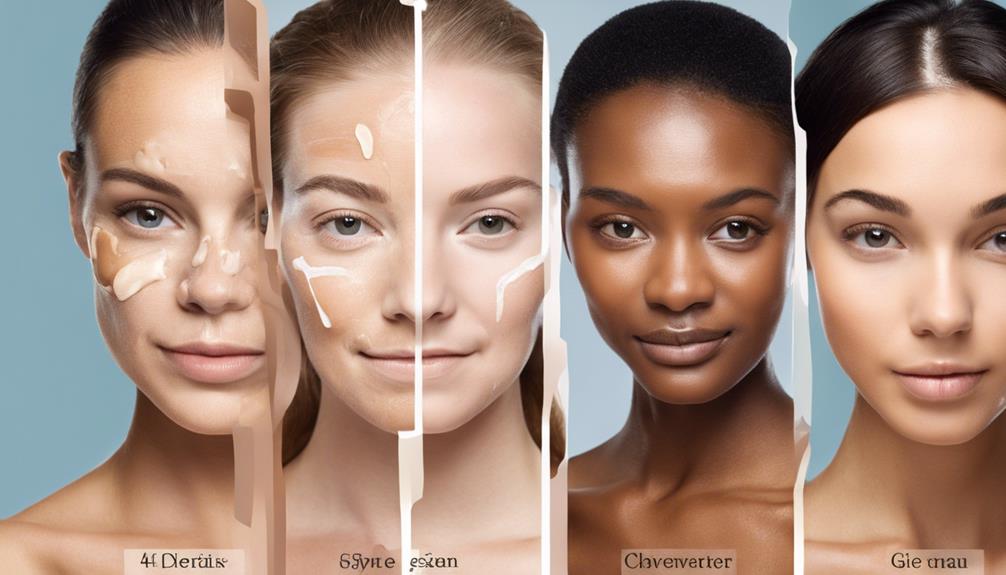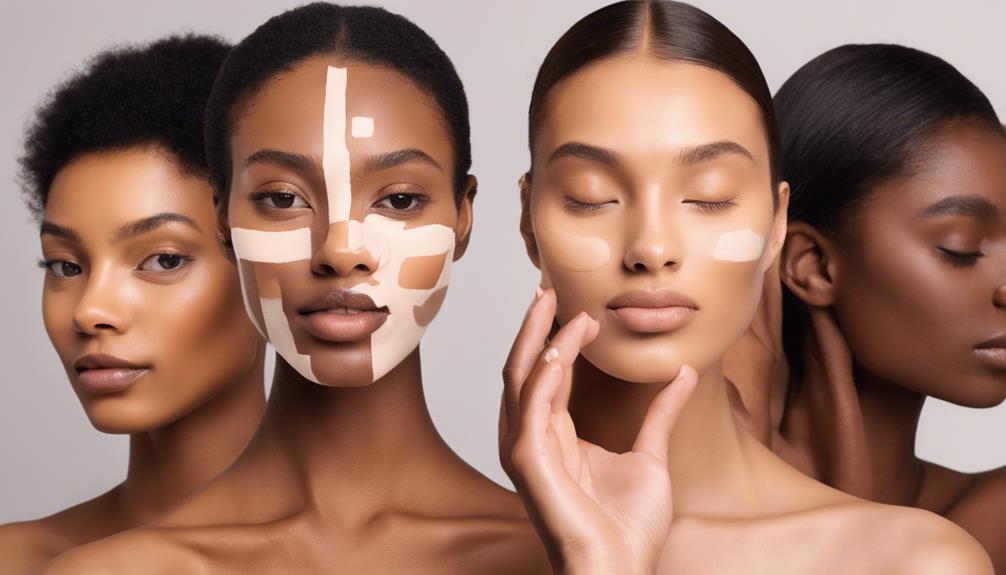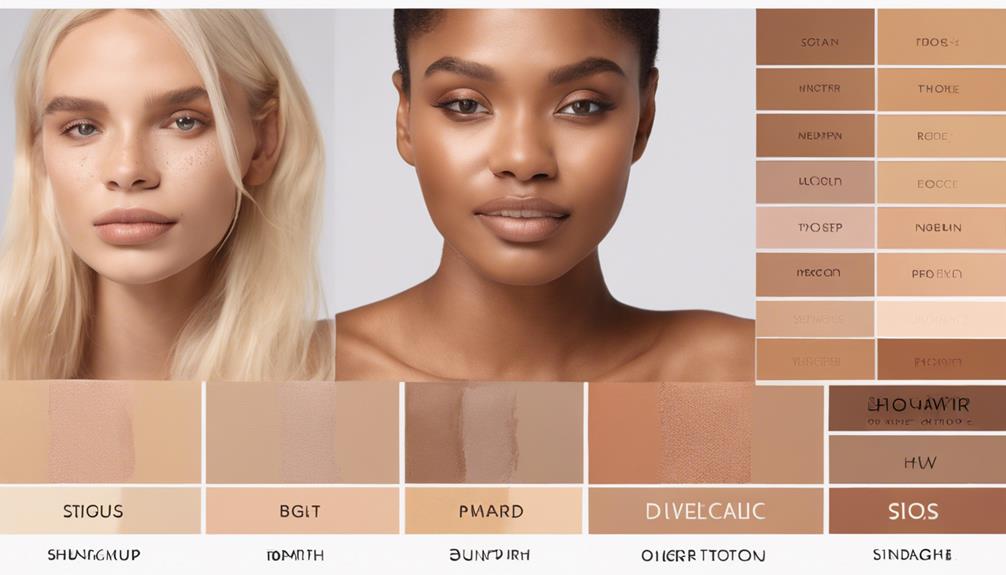How to Choose the Best Foundation for Your Skin Type
When it comes to finding the best foundation for your skin type, the key lies in understanding what works best for your unique complexion. Different skin types require specific formulations to achieve a flawless look that lasts all day. By selecting the right foundation that caters to your skin's needs, you can enhance your natural beauty effortlessly. But how exactly do you navigate the vast array of options out there to pinpoint the perfect match for your skin? Let's unravel the mystery behind choosing the ideal foundation for your skin type together.
Determine Your Skin Type
To choose the best foundation for your skin, the first step is to accurately determine your skin type. Understanding your skin type is crucial as it guides your skincare routine and makeup preferences. There are generally four main skin types: normal, oily, dry, and combination.
Normal skin is well-balanced, neither too oily nor too dry. Oily skin tends to produce excess sebum, leading to a shiny complexion and potential acne breakouts. Dry skin lacks moisture, often feeling tight and flaky. Combination skin has a mix of oily and dry areas, requiring a tailored approach.
To identify your skin type, observe how your skin feels throughout the day. Take note of any oiliness, dryness, or areas of concern. Consider how your skin reacts to different products and environmental factors. By understanding your skin type, you can choose a foundation that complements your skin's needs, providing the perfect base for your makeup while enhancing your natural beauty.
Consider Coverage and Finish
When selecting a foundation, it's essential to consider both the coverage level and finish that will best suit your skin type and personal preferences. Coverage levels range from sheer to full, catering to different needs. If you have blemishes or uneven skin tone, a medium to full coverage foundation may be ideal. For a more natural look, opt for a sheer coverage that allows your skin to breathe.
Additionally, the finish of a foundation plays a significant role in the overall appearance of your makeup. Matte finishes are perfect for controlling shine and are great for oily skin types. On the other hand, a dewy finish can add a healthy glow to dry skin. It's crucial to match the finish with your skin type to achieve the desired result.
Consider your skin tone when choosing a foundation. Ensure the shade matches your complexion for a seamless blend. Understanding coverage levels and finishes will help you select a foundation that enhances your natural beauty while addressing your skin's specific needs.
Test Shades in Natural Light
Consider testing foundation shades in natural light to ensure an accurate match to your skin tone. Natural light provides the most accurate representation of how a foundation will look on your skin. When indoors, artificial lighting can distort the true color of the foundation, leading to mismatched shades. By stepping outside or standing near a window, you can see how the foundation interacts with your skin tone in natural lighting, helping you select the perfect match.
When testing shades, take into account your skin tone and any makeup preferences you may have.
If you prefer a more natural look, opt for a foundation shade that closely matches your skin tone. For those who enjoy a more dramatic makeup style, you might want to choose a shade slightly lighter or darker to achieve the desired effect.
Check for Skin-Friendly Ingredients
For a foundation that not only enhances your skin but also keeps it healthy, checking for skin-friendly ingredients is key. When selecting a foundation, it's crucial to avoid harmful chemicals that can irritate or damage your skin. Look for foundations that are free from parabens, sulfates, phthalates, and synthetic fragrances, as these ingredients can be harsh and potentially harmful to your skin in the long run.
Instead, opt for foundations that contain natural ingredients like aloe vera, green tea extract, vitamin E, or hyaluronic acid, which not only provide coverage but also offer skincare benefits.
Consider foundations that are specifically formulated to nourish and protect your skin while providing a flawless finish. Ingredients like antioxidants, moisturizers, and SPF can help improve your skin's health over time. By choosing a foundation with skin-friendly ingredients, you can ensure that your makeup routine supports your skincare goals and promotes a radiant, healthy complexion.
Match Foundation to Your Undertone
Wondering how to ensure your foundation seamlessly blends with your skin? Understanding your undertone is key to finding the perfect match. Undertone compatibility is crucial in determining whether a foundation will harmonize with your skin or appear mismatched. Undertones can be warm, cool, or neutral, and identifying yours can help in choosing the right shade.
To find the right shade based on your undertone, consider whether your skin undertones lean towards warm or cool tones. Warm undertones typically have hints of yellow, peach, or golden hues, while cool undertones may have pink, red, or blue undertones. Neutral undertones have a mix of both warm and cool tones.
When selecting a foundation, opt for shades that complement your undertone to achieve a seamless and natural look. Testing the foundation on your jawline or inner wrist can help determine if the color blends well with your skin. By matching your foundation to your undertone, you can ensure a flawless finish that enhances your natural beauty.
Choose the Right Application Technique
When applying foundation, the technique you use can significantly impact the overall look and longevity of your makeup. To ensure a flawless application, consider these blending tips:
– Blending Tips:
| Blending Technique | Description |
|---|---|
| Damp Beauty Blender | Use a damp beauty blender to blend foundation seamlessly for a natural finish. |
| Circular Motions | Apply foundation in circular motions to evenly distribute the product. |
| Light Layers | Build coverage gradually with light layers to avoid a cakey look. |
After blending your foundation, set it in place with a setting powder. Setting powder helps to mattify your skin, minimize shine, and lock your foundation in for extended wear. Remember to use a light hand when applying setting powder to avoid a heavy, powdery look. By mastering these blending techniques and incorporating setting powder into your routine, you can achieve a flawless complexion that lasts all day.
Frequently Asked Questions
Can I Mix Different Foundation Shades to Match My Skin Tone?
Yes, you can mix different foundation shades to match your skin tone. Experiment with color matching and blending for a personalized shade. Adjust undertones by blending shades. This technique allows for a customized foundation that suits your unique skin tone perfectly.
How Do I Prevent My Foundation From Looking Cakey?
To avoid a cakey foundation, ensure your skin is well-prepped. Use a hydrating primer and moisturize beforehand. Apply foundation in thin layers, blending well with a damp sponge or brush. Set lightly with translucent powder for a flawless finish.
What Is the Best Way to Apply Foundation With Acne-Prone Skin?
When dealing with acne-prone skin, start by using a color-correcting primer to even out redness. Opt for a medium coverage foundation to balance coverage without clogging pores. Use a damp sponge for a seamless blending technique. Finish with a setting spray for long-lasting wear.
Is It Necessary to Use a Primer Before Applying Foundation?
Yes, using a primer before applying foundation is necessary. Primer benefits include smoothing the skin, filling in pores, and creating a base for foundation to adhere to, ultimately enhancing foundation longevity for a flawless finish.
How Often Should I Change My Foundation Shade to Match My Skin Changes?
When it comes to your skin tone changes, adjust your foundation shade accordingly. Keep your look fresh by matching your foundation to your evolving skin. Embrace your skin's journey and switch shades as needed.
Conclusion
In conclusion, finding the perfect foundation for your skin type is crucial for a flawless look. By carefully considering your skin type, coverage needs, undertones, and ingredients, you can achieve a truly radiant complexion. Remember, the right foundation can truly transform your entire makeup routine, making you feel like a beauty queen every day! So, don't underestimate the power of a good foundation – it's the key to unlocking your inner glow!












